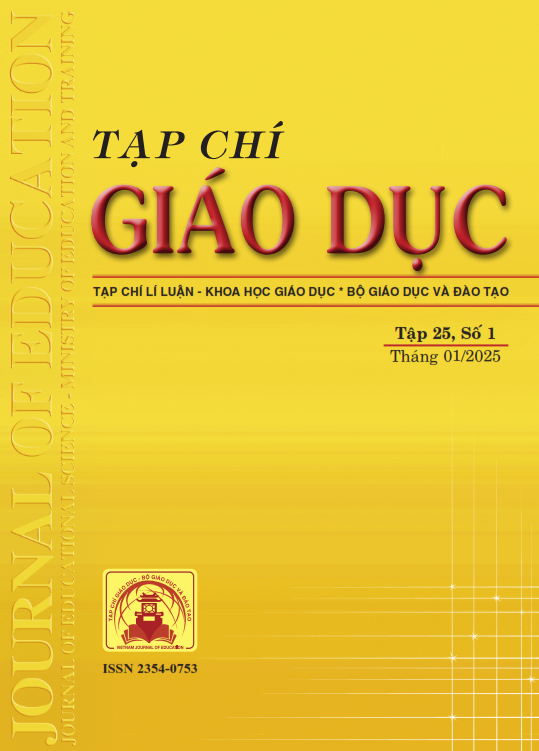Ảnh hưởng của năng lực xã hội đến khả năng đáp ứng yêu cầu công việc của sinh viên khối ngành Kinh tế trong thời đại công nghệ số
Tóm tắt
Training graduates who are capable of effectively meeting job requirements is a critical issue with higher education institutions. This paper examines the impact of social competence on graduates’ ability to meet job requirements in the digital technology context. The research model is based on a literature review and consists of 4 hypotheses. To test the research hypotheses, a sociological survey using questionnaires was employed with graduates from Economics faculties across universities nationwide. Correlation analysis, exploratory factor analysis, and regression analysis were utilized to assess the impact of social competence. The research results show that the structure of social networks, reciprocal relationships, and communication skills positively affect graduates’ ability to meet job requirements, while the quality of social networks does not have a statistically significant impact. Based on the findings, several recommendations have been made for higher education institutions, policymakers, employers, and students to improve the Economics graduates’ job-readiness in the digital technology context.
Tài liệu tham khảo
Bourdieu, P. (1986). The forms of capital. In J. Richardson (Ed.), Handbook of Theory and Research for the Sociology of Education (pp. 241-258). Greenwood Press.
Bridgstock, R., Goldsmith, B., Rodgers, J., & Hearn, G. (2015). Creative graduate pathways within and beyond the creative industries. Journal of Education and Work, 28(4), 333-345.
Bùi Quang Bình (2009). Vốn con người và đầu tư vào vốn con người. Tạp chí Khoa học và Công nghệ, Đại học Đà Nẵng, 2(31), 1-8.
Caballero, J. A., Hopenhayn, H. A., & Shimer, R. (2011). Establishment dynamics and labor market fluctuations. Quarterly Journal of Economics, 126(3), 1363-1410.
Caballero, R. J., Cowan, K. N., Engel, E. M., & Micco, A. (2013). Effective labor regulation and microeconomic flexibility. Journal of Development Economics, 101, 92-104. https://doi.org/10.1016/j.jdeveco.2012.08.009
Campbell, A. (2018). The Changing Landscape of Work: Trends and Implications for the Future. Harvard Business Review Press.
Clarke, M. (2018). Revisiting the role of language in higher education: The influence of EMI. Language and Education, 32(1), 48-62.
Deloitte. (2020). Global Human Capital Trends 2020: Leading the Social Enterprise-Reinvent with a Human Focus. Deloitte Insights.
Hair, J. F., Black, W. C., Babin, B. J., & Anderson, R. E. (2013). Multivariate data analysis. Pearson.
Harvey, L. (2001). Defining and Measuring Employability. Quality in Higher Education, 7(2), 97-109. https://doi.org/ 10.1080/13538320120059990
Hien, H. T. N., & Khanh, N. P. G. (2021). Graduate employability in double challenge of post-covid labor market and digital transformation: The role of graduate’s capitals, 4.0 skills, attributes and perceived labor market. Ho Chi Minh City Open University Journal of Science-Social Sciences, 11(2), 85-107.
Hillage, J., & Pollard, E. (1998). Employability: Developing a framework for policy analysis (Vol. 107). London, UK: DfEE.
Hinai, H., & Bhuiyan, M. H. (2021). Emerging trends in digital transformation: A comprehensive review. Journal of Strategic and International Studies, 17(1), 25-42.
Lê Ngọc Hùng (2008). Vốn xã hội, vốn con người và mạng lưới xã hội qua một số nghiên cứu ở Việt Nam. Tạp chí Nghiên cứu Con người, 37(3), 45-54.
Lock, J., & Kell, L. (2020). Navigating the Future: Strategies for Graduates in a Competitive Job Market. Journal of Career Development, 47(4), 556-572.
Nahapiet, J., & Ghoshal, S. (1998). Social capital, intellectual capital, and the organizational advantage. Academy of Management Review, 23(2), 242-266. https://doi.org/10.5465/amr.1998.533225
Nguyen, T. T. Q., Ghi, T. N., & Nguyen, T. T. (2023). Social capital and digital transformation of startups in Vietnam during the covid-19 pandemic: the mediating role of human capital and access to resources. Management Systems in Production Engineering, 31(1), 33-42. https://doi.org/10.2478/mspe-2023-0005
Phạm Xuân Quỳnh, Cao Văn Hơn (2018). Ảnh hưởng của vốn xã hội đến khả năng tìm việc làm của sinh viên tốt nghiệp. Tạp chí Khoa học, Trường Đại học Đồng Tháp, 33, 35-44.
Potgieter, I., Coetzee, M., & Ferreira, N. (2023). University students’ digital world of work readiness in relation to their employability competency. Journal of Learning Development in Higher Education, 27.
Trần Huy Phương, Vũ Hoàng Ngân, Ngô Quỳnh An (2021). Dự báo nhu cầu kĩ năng của sinh viên khối ngành Kinh tế và kinh doanh từ góc nhìn của doanh nghiệp. Tạp chí Kinh tế và Dự báo, 33, 73-76.
Trần Thị Hoài, Nguyễn Thái Bá (2020). Nghiên cứu các năng lực của sinh viên tốt nghiệp thích ứng với cuộc Cách mạng công nghiệp 4.0. VNU Journal of Science: Education Research, 36(1), 75-88.
Van Laar, D., Van Deursen, A. J. A. M., Van Dijk, J. A. G. M., & Deursen, A. J. A. M. (2017). The relation between 21st-century skills and the use of digital media in education. Computers & Education, 106, 1-11. https://doi.org/10.1016/j.chb.2017.03.010
Võ Hồng Phượng, Huỳnh Trường Huy (2018). Đánh giá mức độ đáp ứng với nghề nghiệp của sinh viên ngành du lịch ở Đồng bằng sông Cửu Long. Tạp chí Khoa học và Kinh tế phát triển, 03, 9-18.
Tải xuống
Đã Xuất bản
Cách trích dẫn
Số
Chuyên mục
Giấy phép

Tác phẩm này được cấp phép theo Ghi nhận tác giả của Creative Commons Giấy phép quốc tế 4.0 .












